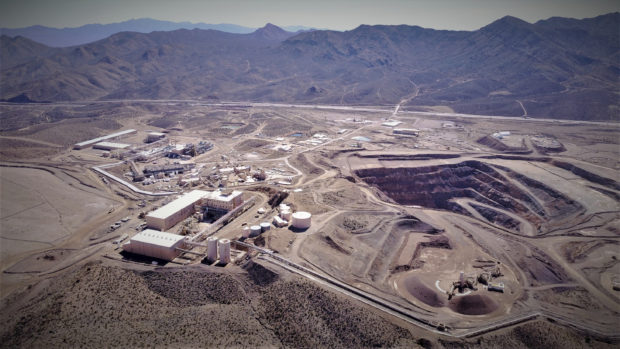US-China trade war sparks worries about rare minerals
PHOENIX – Rising trade tensions between the U.S. and China have sparked worries about the 17 exotic-sounding rare earth minerals needed for high-tech products like robotics, drones and electric cars.
China recently raised tariffs to 25% on rare earth exports to the U.S. and has threatened to halt exports altogether after the Trump administration raised tariffs on Chinese products and blacklisted telecommunications giant Huawei.
With names like europium, scandium and ytterbium, the bulk of rare earth minerals are extracted from mines in China, where lower wages and lax environmental standards make production cheaper and easier.

This undated photo provided by JHL Capital Group LLC shows the Mountain Pass Mine in San Bernardino County, Calif. the only producer of rare earth minerals in the United States. Rising trade tensions have many people worried about the 17 exotic-sounding rare earth minerals needed to make high-tech products like robotics, drones and electric cars. But trade experts say China’s recent threats to stop all imports of the minerals to the U.S. are not cause for panic. (JHL Capital Group LLC. via AP)
But trade experts say no one should panic over China’s threats to stop exporting the elements to the U.S.
There is a U.S. rare minerals mine in California.
And Australia, Myanmar, Russia and India are also top producers of the somewhat obscure minerals. Vietnam and Brazil both have huge rare earth reserves.
Article continues after this advertisement“The sky is not falling,” said Mary B. Teagarden, a China specialist, professor and associate dean at the Thunderbird School of Global Management in Phoenix. “There are alternatives.”
Article continues after this advertisementSimon Lester, associate director of the center for trade policy studies at the Cato Institute think tank in Washington, agreed.
“Over the short term, it could be a big disruption, but companies that want to stay in business will find a way,” he said.
Although the U.S. is among the world’s top 10 countries for rare earths production, it’s also a major importer of the minerals, looking to China for 80% of what it buys from other countries, according to the U.S. Geological Survey.
China last year produced some 120,000 metric tons of rare earths, while the United States produced 15,000 metric tons.
The United States also depends on China to separate the minerals pulled from Mountain Pass Mine, the sole rare earths mine in the U.S., which was bought two years ago by the Chicago-based JHL Capital Group LLC .
“We need to develop a U.S.-based supply chain so there is no possibility we can be threatened,” said Ryan S. Corbett, managing director of JHL Capital.
The mine’s top products are neodymium and praseodymium, or NdPr, two elements which are used together to make the lightweight magnets that help power electric cars and wind turbines and are found in electronics such as laptop hard drives.
Mountain Pass, located in San Bernardino County, California, was once top supplier of the world’s rare earth minerals, but China began taking over the market in the 1990s and the U.S. mine stopped production in 2002.
Mountain Pass later restarted production only to close again amid a 2015 bankruptcy. /gg